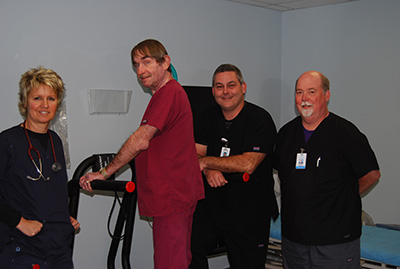201 Bailey Lane Benton, IL 62812
Franklin Hospital (618) 439-3161
Benton Walk-in Clinic (618) 435-9751
Christopher Walk-in Clinic (618) 435-9699
West Frankfort Walk-in Clinic (618) 932-2200

This is a picture of some of the staff in the Cardiopulmonary Department
CARDIOPULMONARY SERVICES
The Cardiopulmonary Department performs all routine respiratory therapy duties, including BiPAP therapy, pulmonary function testing, EKGs, Holter monitoring, and cardiac stress tests. These services are provided through the hospital, including the Specialty Clinic.Cardiopulmonary Services include:
Respiratory Therapy: Most people take breathing for granted. It's an involuntary reflex. But for those who suffer from breathing problems, each breath is a significant accomplishment. These people may be suffering from a chronic lung disease or have acute problems, which can be reversed with respiratory treatments.
BiPAP Therapy: BiPAP (also referred to as BPAP) stands for Bilevel Positive Airway Pressure and is very similar in function and design to a CPAP machine continuous positive airway pressure). A BiPAP machine is a non-invasive form of therapy used to treat patients in acute respiratory distress/failure by decreasing carbon dioxide and increasing oxygen levels in the blood. BiPAP is also used to treat patients suffering from sleep apnea. The machine delivers pressurized air through a mask to the patient's airways. The air pressure keeps the throat muscles from collapsing and reduces obstructions by acting as a splint. The BiPAP machine allows patients to breathe easily and regularly throughout the night.
Electrocardiogram: An EKG is a safe and painless test that records electrical impulses normally produced by the heart. Your doctor may recommend an EKG for various reasons, including chest pain, shortness of breath, dizziness, and irregular heartbeat.
Pulmonary Function Test: PFTs measure the health of your lungs and enable your doctor to detect changes in respiratory function. Many causes of lung problems can be successfully treated when detected early. The Jaeger Masterscreen PFT System quickly and safely provides accurate diagnostic results in patients with: Chronic Obstructive Pulmonary Disease (COPD), Pulmonary Fibrosis, Asthma, Black Lung, Shortness of Breath, Assessment of Dyspnea, Neuromuscular Disease, and Pre-Op Screening.
Holter Monitoring: A Holter monitor is a machine that continuously records the heart's rhythm. The monitor is worn for 24 to 72 hours during regular activity. The monitor is a small device placed directly on the chest just above the heart via an adhesive ePatch and records the heart's electrical activity. A diary of activities performed and how the patient felt while wearing the monitor is kept for the doctor's review. After 24 to 72 hours, the monitor is returned to the Cardiopulmonary Department. The doctor will look at the monitor and records to see if there have been any abnormal heart rhythms.
The Cardiopulmonary Department is located on the 1st floor west, next to the Emergency Department. For more information about the Cardiopulmonary Department, contact Frank Cline at (618) 435-9630 or email frank.cline@franklinhospital.net.
